EA Nigeria Summit was the first EA-related conference in Nigeria, and it took place from September 6th to 7th, 2024. The event saw a higher level of interest than we (the organisers) expected. We received applications from individuals across Nigeria and the international community, especially Africans. We accepted 170 applicants for the summit, and a total of 136 participants attended the event.
The summit provided an opportunity for the attendees to connect, network, and share ideas and practices, paving the way for potential collaboration and impactful actions at the cost of USD 179.6 per attendee.
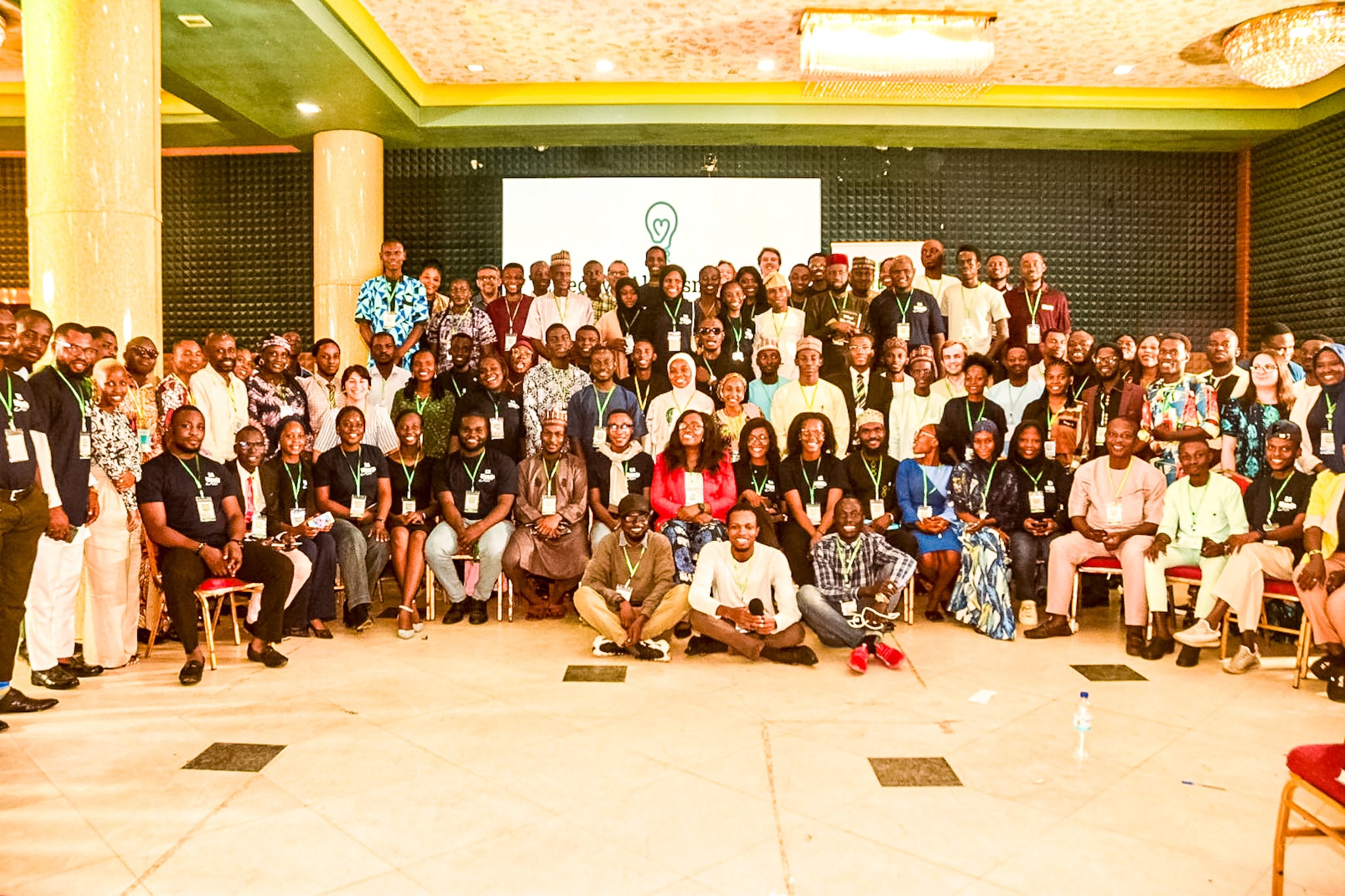
Some Key Specifics
Location - Chida Event Centre, Utako, Abuja, Nigeria.
Applications received - 472, (18 applications were duplicates)
Admitted applicants - 170
Confirmed attendees - 137
Number of speakers - 14
Total Expenses - USD 24,611
Cost per attendee - 179.6 USD
The first EA-aligned conference in Nigeria!
We are so excited that this summit has happened, more specifically given it’s the first EA-aligned conference in Nigeria. Organising the summit has enabled us to test the possibility, which relatively seems positive for us despite a few challenges. It implied to us that:
- We can bring aligned individuals together from different parts of the country and even the international community, which is exciting for us.
- It shows us that we can tailor content and activities to make the atmosphere compiling and interactive.
- We rallied the support of the aligned individuals and organisations in the country to contribute to the ideas and share their practices.
The two-day summit was held at Chida Event Centre; we prioritised the venue because it could cater to our summit needs, was accessible from all parts of Abuja, and was affordable compared to other similar options in the city center.
Summit Goal and Strategy
Initially, the purpose and goal we set out for the summit was to gather like-minded individuals from Nigeria, Africa, and other international locations who are thinking carefully about some of the world's biggest problems, taking impactful action to solve them, or exploring ways to do so and give them avenues to share knowledge, network, and explore collaboration opportunities to promote impactful practice and actions.
We set out a specific target audience and aimed at admitting 100+ individuals, with an emphasis on:
- Existing engaged members of the EA Nigeria community.
- Nigerian individuals who are familiar with effective altruism, such as those who completed an intro program, 20+ hours engaging with EA content/book, or working for EA-aligned organisations in Nigeria.
- Individuals from African countries who are familiar with and engage with the EA community.
- International individuals with aligned projects operating in Nigeria or those who could contribute to the event's impact.
To realise our goal and mission, we tailored the summit content into talks, discussion sessions, workshops, one-on-one, panel sessions, and unstructured time for networking opportunities.
Early on, the specific metrics we set out for tracking the impact of the summit are:
- The value of the summit to the attendees
- Summit impact on career/actions[1]
- Likelihood of recommending future summit iteration to a friend or colleague thinking about the impact
- The number of new connections, defined as an attendee meeting someone new who they then feel comfortable reaching out for a favour.
Attendees & Experience
Individuals who attended the summit comprised professionals, students, and early careers with different backgrounds, but all shared a mission of making a meaningful, positive impact on the world. The event wasn’t just a chance to learn, but also a networking and collaboration avenue with others who are on the same journey. Per the survey we ran after the summit, many attendees indicated having a good experience and found the summit valuable.
The feedback we ran after the summit has been overwhelmingly positive. Most attendees rated the summit very highly, with many giving it a solid 10/10 on whether they would recommend it to a friend or colleague. This shows just how much value people took away from the event. Attendees found different contents and activities to be valuable and It wasn’t just about the presentations and talks—attendees appreciated the connections they made and the deep conversations they had with others who are equally passionate about making a difference in the world. The average for recommendation to another person is 9.7/10
A lot of attendees mentioned how the summit helped them expand their understanding of effective altruism and gave them a clearer sense of how they can apply these principles in their own work or career paths.
A lot of attendees found the sessions valuable and invaluable, with valuable outweighing invaluable all across, the discussion sessions, one-on-one, talks, were the highlight. The discussions and one-on-one gave attendees the chance to dive into more personalized discussions and ask specific questions, which left them with new connections and ideas that they were excited to follow up on. The informal moments—like during breaks, lunch, and social— turned out to also be positive and valuable.
One participant shared how inspiring it was to meet other attendees from other locations aside from Nigeria who are just as focused on addressing major global issues through effective altruism practice. Being surrounded by people with similar goals but different approaches led to some valuable and eye-opening exchanges.
All in all, the summit left a lasting impression, and many attendees are looking forward to staying in touch and applying what they’ve learned. Some even expressed interest in being more involved in future EA Nigeria projects, which speaks volumes about how much they valued the experience.
Budgeting & Finances
The total revenue raised for the summit was USD 25,000 which came from the Centre for Effective Altruism’s Events Team. The grant enabled us to make the summit ticket-free, which means we didn’t sell tickets for the event.[2]
The expenses for the summit fall into 8 categories, namely: Venue, Meals, Media, Printing, Insurance, Travel support, Organisers Stipends and Miscellaneous.
- Venue: We paid for 3 halls and open premises. These halls allow us to manage concurrent sessions and gather all attendees in the main theatre hall. We used open premises for lunch, registration, and networking.
- Meals: We provided vegetarian meals for all three meals each day, including breakfast, lunch, and dinner.
- Media: We outsourced interactive media, audio, photography, and internet services to a dedicated firm with whom we worked throughout the summit days.
- Printing: We printed 2 roll-up banners, 1- hang-on banner, and 250 t-shirts which were outsourced to a dedicated firm.
- Insurance: Most of the issuance companies in Abuja are too skeptical about event insurance. Those that are providing insurance coverage are strategic in what they can cover. After much hassle, we were able to secure a group insurance coverage for the summit for accident and life.
- Travel support: Travel support surged over half our budget. We provided 100 people with travel support, out of which 49.70% went for Internationals and 50.30% for Nigerians. As of the time of writing this retrospective, we are expecting a refund of $1810 from two admitted attendees who could not make it to the summit due to various reasons.
- Organisers Stipends: Summit organising activities began in late April 2024, and between April, May, and June 2024, the estimated hours spent are: 67.5 hours In April, May, and June, 72.5 hours in July/August, and 176 hours in September/October including volunteer time. That’s a total of 316 hours organising. Organiser stipends for their hours are paid at $8/hour.
Miscellaneous costs spread across such as stationery and equipment rents, like printers, extra tables, water, etc.
Content
The content of the Summit was tailored to advance knowledge, ideas, and understanding among attendees to help them refine, tailor, or impactfully accelerate their exploration and action. The spread of the content includes:
- Those that focused on expanding attendees' understanding of applying ideas to practical actions to save or improve lives. We have seven (7) talks in this category. Talks from Family Empowerment Media, The Taimaka Project, Lafiya Nigeria, Innovation Poverty Action, Evidence Action, Dimagi/Commcare Connect Initiative and BudgeIT Foundation.
- Those that focused on improving understanding and approaching actions. We have three (3) sessions in this category from speakers representative of the Center for Effective Altruism, Ambitious Impact, and IQVIA.
- Sessions that focused on knowledge advancement in specific cause areas. We have representatives from Open Philanthropy, Effective Altruism Nigeria, Partnership For Future Generation in Africa, and, Dogalov Human Support Initiative,
- Panel sessions, office hours, and roundtable discussion sessions provide opportunities for attendees to ask speakers questions that they did not get a chance to ask during their session and to gain a deeper understanding of their work. While the discussion sessions also contributed to advancing knowledge and network.
Production & Logistics
The summit took us 6 months (April - September) to plan and execute, and we spent 316 hours working towards achieving our goal. This generally involved coordinating various aspects of the summit's needs and dealing with negotiations and contingencies as they arise.
Dealing with Vendors:
We had various vendors to handle different aspects of our summit needs, such as catering, Interactive media and videography, and printing.
A lot of time was spent searching for the right vendors to work with us. Trying to get the ones who would deliver their services and whose quotations fit our budget involved some back-and-forths, but in the end, we were able to get the right ones.
Securing the Summit Venue:
Securing the summit venue took us about two months to get the right place for our event.
Abuja is one of the fastest growing cities in Africa, as such, there were a lot of options to choose from in the city center and venues to inspect; negotiating with the management of different venues. It is worthy of note that Chida event centre was not our first choice of venue for the summit, we only went to Chida event centre after our initial choice had setbacks due to an event that was clashing with ours in the venue, we got to know this early enough to change our venue to the one we eventually used.
We struggled to find common ground with the management of the Chida event centre at the initial stage of preparations for the summit, we spent a lot of time negotiating terms and conditions in terms of the cost of additional halls and other logistics but finally, we reached an agreement a few weeks before the summit. Though we already had almost 80% understanding before our final agreement.
Video Production and Photography
We worked with a contractor for our video production and the same contractor handled our interactive media and provided all the screen and other tech services, such as internet. They recorded speaker sessions and workshops with two robotic cameras that were remotely controlled to avoid movement and distractions during the sessions.
A vendor working closely with them handled the photography for the summit, capturing key moments and activities with the highlight being the group pictures that were taken during the last day of the summit.
Printing
We printed T-shirts for the summit, two hundred and fifty pieces (250) which were made available for the attendees. We also printed 2 roll-up banners and 1 large banner (3x2 ft) which was placed at the entrance of the summit venue to provide direction to participants. Other printing offered by the same vendor were name tags. We handled printing discussion questions and related questions during the summit, and we rented a printer for it.
Logistics (Summit Day 1 & 2)
To make sure everything was running smoothly, we had all taken various roles during the summit days; Christopher Isu, Folajomi Amao, Khadijah Sabiu were at the registration/help desk to register participants and attend to inquiries, Chidi Odinanwa liaised between speakers and MC’s ensuring speakers and MC’s were on ground and ready for their sessions when it was time, Daniel Elabi coordinated with the venue management, caterers and other vendors, Adebayo Mubarak coordinated with recording and interactive media, made all the printings and ensured each content for sessions were ready before time while Zakariyau Yusuf oversaw the entire coordination of the summit and provides backend support across the team.
Communication & Event Tech
The tech we used for the summit was mainly Swapcard to integrate attendees into the event, where they were able to have an overview of the agenda, choose the sessions to attend, and set up one-on-one meetings.
We also created a WhatsApp group to enable attendees to communicate instantly. WhatsApp is popular and used by most people with smartphones in Nigeria, so we deployed it to enable attendees to communicate timely. For the EA Nigeria organising team, more structured communication was mainly sent out via email.
Also, we compiled a six (6) page document which provided guidance and information regarding the summit. We shared it three weeks before the summit to enable attendees to have a smooth summit experience.
A 3x2 LED screen was used in the main hall for the presentation of slides for speakers. Two 32-inch TVs were also in one of the smaller halls for the workshop. We also had public address systems set up with extra microphones for our panel discussion sessions and questions from the audience.
Some Additional Brief
Organising the summit enabled us to learn so much and we think it’s worth noting the following few aspects that stand out for us:
- Early planning and preparation: We found it so helpful with early planning, it allowed us to reflect, get feedback, and re-strategize.
- EAGx Handbook: This handbook was so helpful to us and accelerated our progress, and we think that it’s worth referring to for anyone thinking of organising similar events.
- Good relationships with vendors: For us, we affirm that this is very important, especially facility management and tech service. At some point, they were very proactive and helpful more than we expected.
Core Team & Volunteers
The summit core team comprises of:
Mubarak Adebayo: Admission and Media
Chidi Odinanwa: Speaker and volunteer coordination
Daniel Elabi: Operation and communication
Zakariyau Yusuf: Stewardship and overall coordination
The main volunteers are:
Christopher Isu - Logistics and support
Folajomi Amao - Registration and support
Motiloluwa Abiola - Attendee support
Khadijah Sabiu - Registration and support

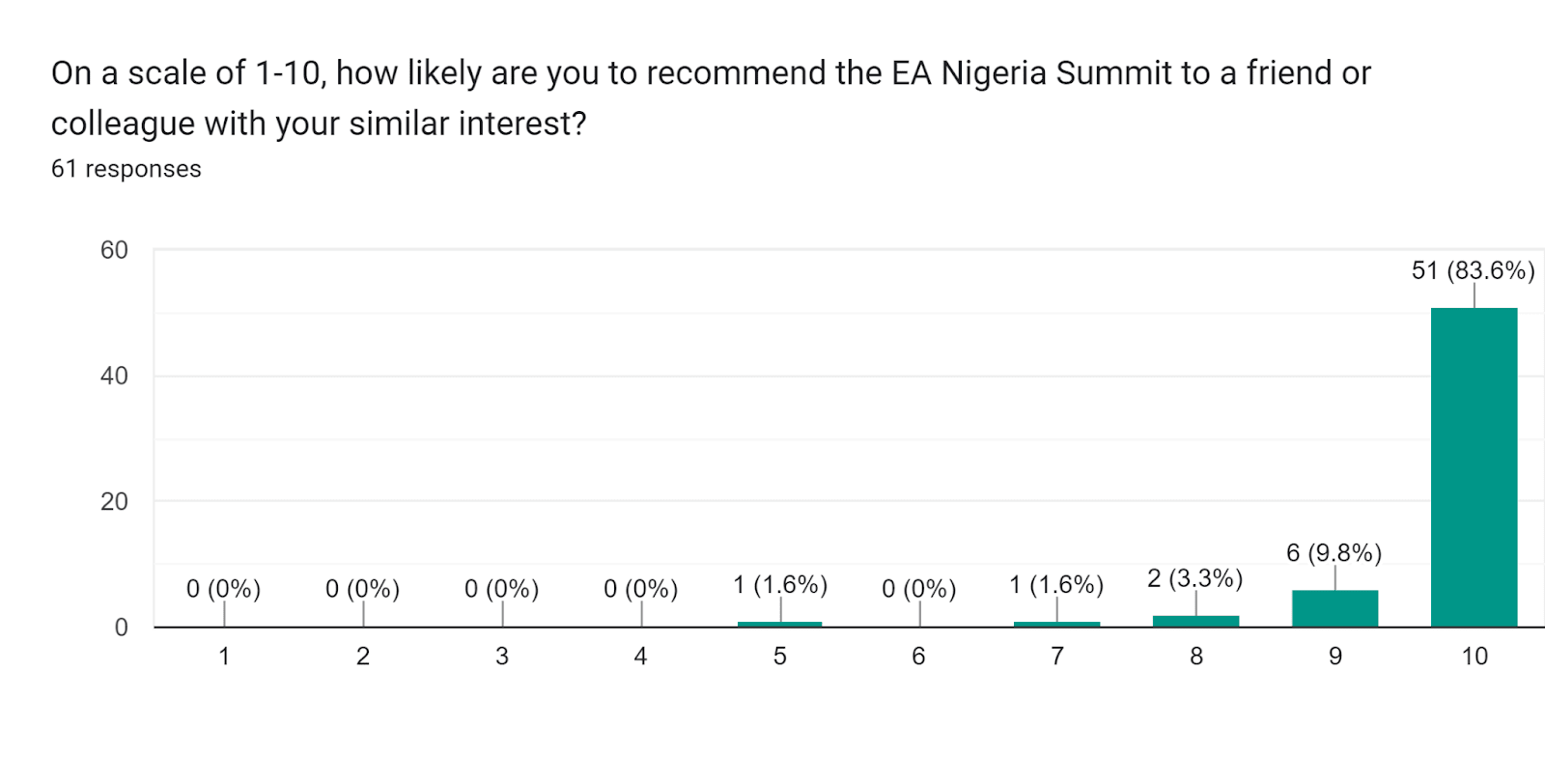
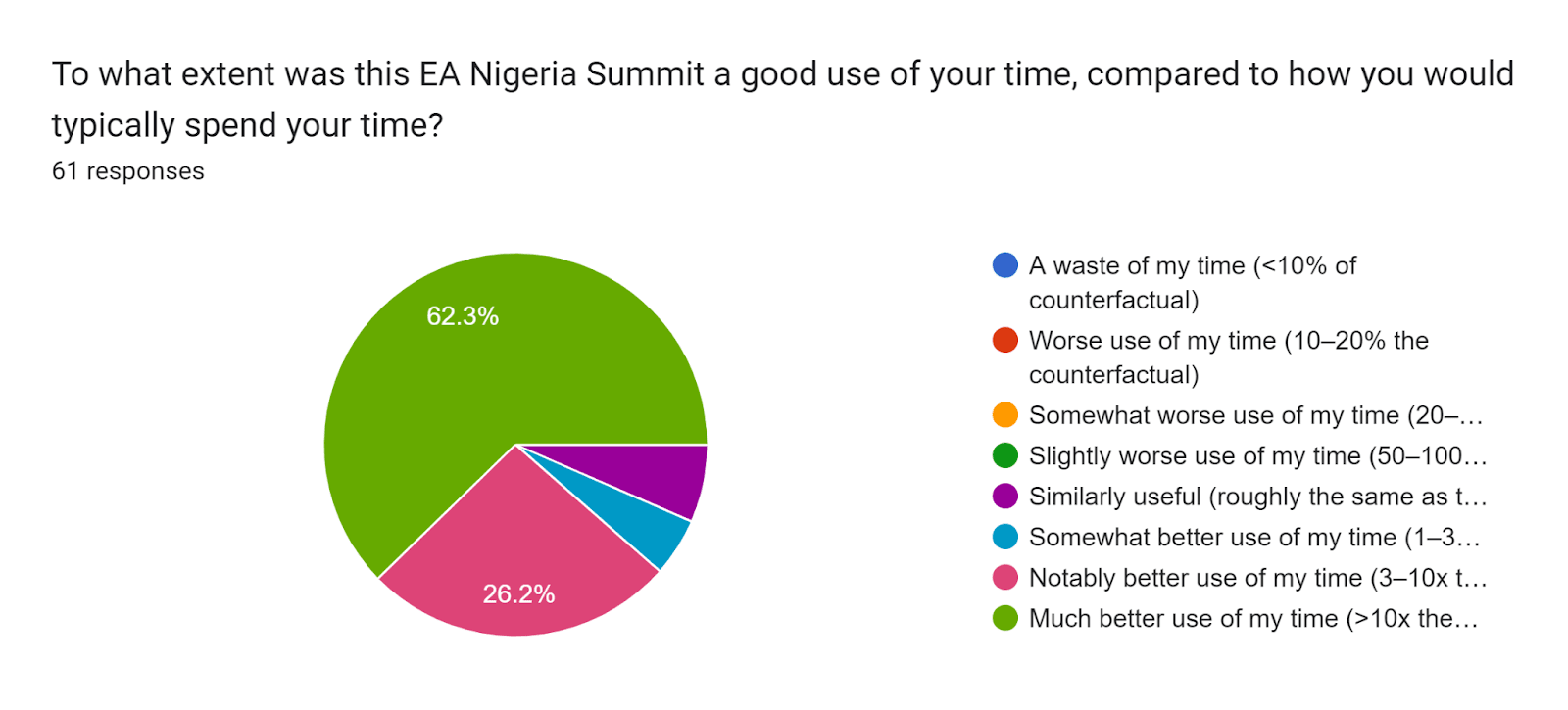

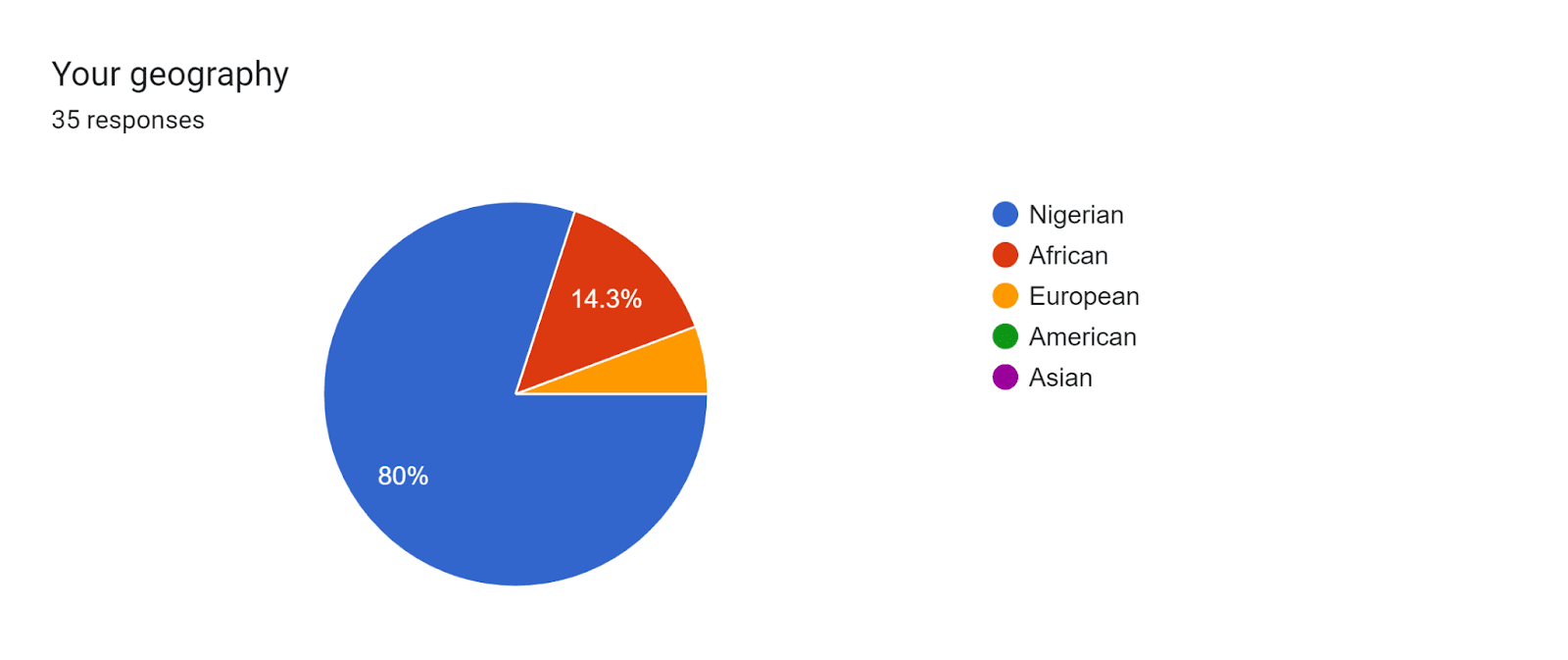
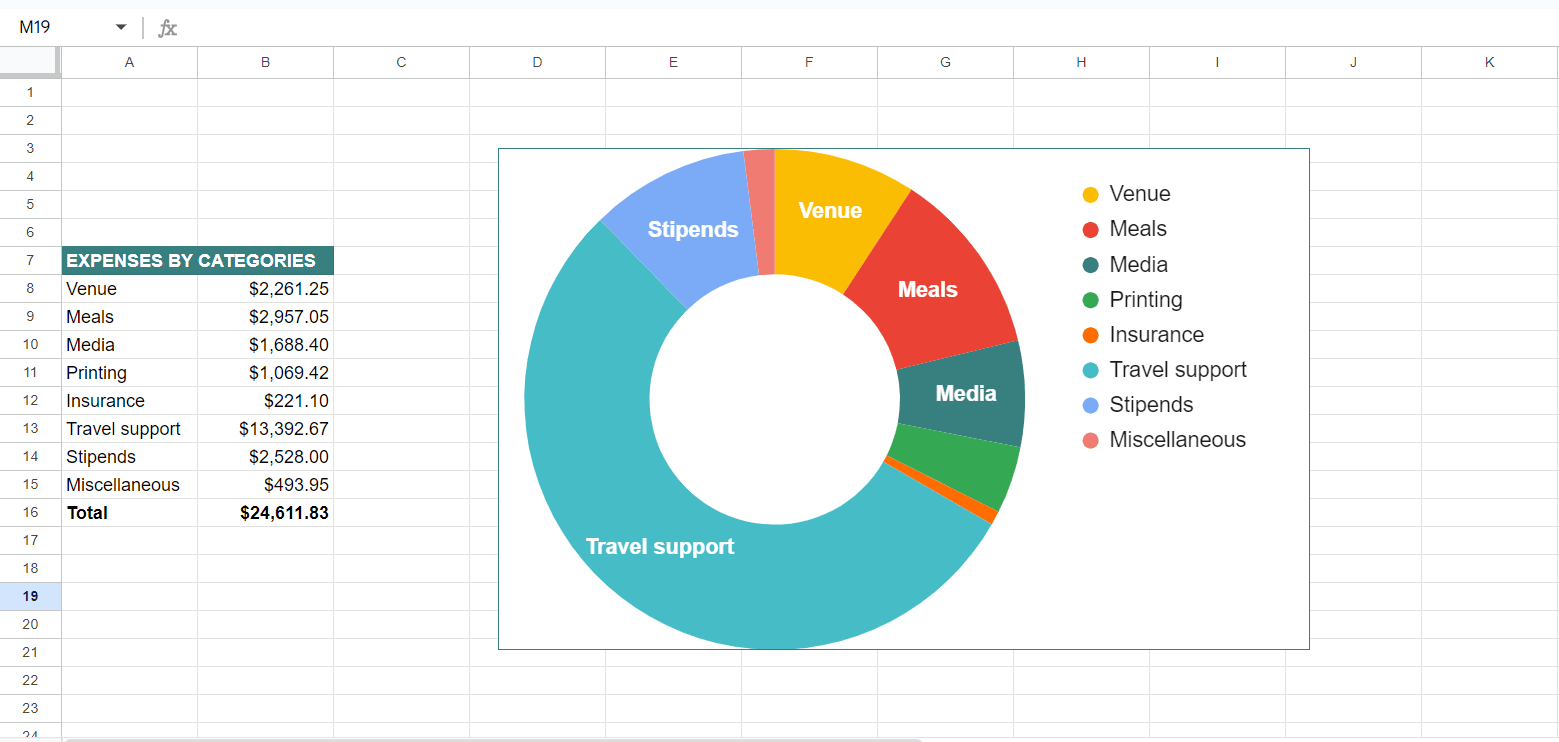
I want to add that my colleagues and I on the CEA events team were really impressed with this event.
I'm very excited to see more EA events in Nigeria!
Thanks, Ollie! Your timely feedback and input significantly shaped the summit's direction, and the EAGx Handbook was so valuable to us.
I must say the EA Nigeria Summit was really profound for me as an attendee. I had the opportunity to meet with other altruist and exchange ideas and also learn better ways to improve my work as well as my personal life from the various presentations from the speakers. It was really an epiphany moment for me.
It looks and sounds like the event was a great success ! Im really happy about that :)
Could you provide some more info about the applicants and the admissions process/decisions? e.g.:
Thanks!
Congratulations to EA Nigeria for facilitating such an inspiring event and thank you for inviting Lafiya Nigeria to share our program experience!
Attending the Effective Altruism Nigeria Summit profoundly impacted my life, shaping my understanding of cultivating an effective mindset across all areas, from personal growth to professional development.
9.7/10 average rating* is extremely good. Well done!
Also cool to see the Nigerian and African EA community growing. Keep us updated!
(*I don't think average rating is the most important metric, the expected impact from the conference seems more important, but it's a useful metric nevertheless)
Congrats on organising such a successful conference! I'm impressed by how much interest there was in the event :)
This is really impressive and inspiring to see! Big congratulations to the team for your hard work in putting together what seems like a highly impactful conference :) Looking forward to seeing how EA Nigeria continues to evolve.
Executive summary: The first EA Nigeria Summit in September 2024 was successful, with 136 attendees from Nigeria and internationally, providing valuable networking and learning opportunities at a cost of $179.60 per attendee.
Key points:
This comment was auto-generated by the EA Forum Team. Feel free to point out issues with this summary by replying to the comment, and contact us if you have feedback.
Congrats EA Nigeria!
Is there any place to see more about who spoke about what? Any recorded talks?
Thanks, Elliot.
Sharable recordings are on YouTube: https://youtube.com/playlist?list=PLwp9xeoX5p8N7W_pr9N4hWQrPp_0j5Qhj&si=ti1o7Fh-HGaDzpYh.
thank you! good job on the quick turnaround!